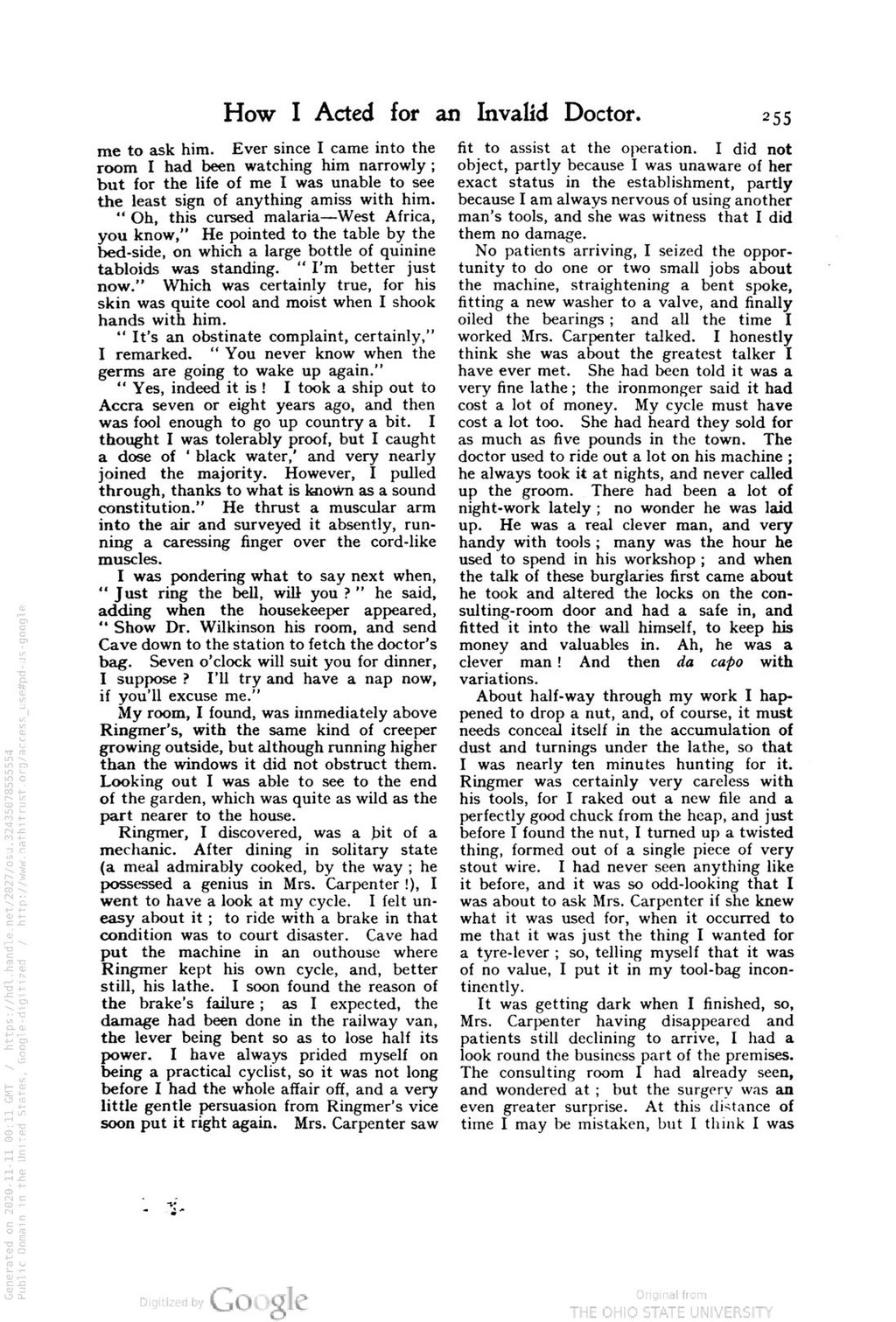me to ask him. Ever since I came into the room I had been watching him narrowly; but for the life of me I was unable to see the least sign of anything amiss with him.
"Oh, this cursed malaria—West Africa, you know," He pointed to the table by the bed-side, on which a large bottle of quinine tabloids was standing. "I'm better just now." Which was certainly true, for his skin was quite cool and moist when I shook hands with him.
"It's an obstinate complaint, certainly," I remarked. "You never know when the germs are going to wake up again."
"Yes, indeed it is! I took a ship out to Accra seven or eight years ago, and then was fool enough to go up country a bit. I thought I was tolerably proof, but I caught a dose of 'black water,' and very nearly joined the majority. However, I pulled through, thanks to what is known as a sound constitution." He thrust a muscular arm into the air and surveyed it absently, running a caressing finger over the cord-like muscles.
I was pondering what to say next when, "Just ring the bell, will you?" he said, adding when the housekeeper appeared, "Show Dr. Wilkinson his room, and send Cave down to the station to fetch the doctor's bag. Seven o'clock will suit you for dinner, I suppose? I'll try and have a nap now, if you'll excuse me."
My room, I found, was immediately above Ringmer's, with the same kind of creeper growing outside, but although running higher than the windows it did not obstruct them. Looking out I was able to see to the end of the garden, which was quite as wild as the part nearer to the house.
Ringmer, I discovered, was a bit of a mechanic. After dining in solitary state (a meal admirably cooked, by the way; he possessed a genius in Mrs. Carpenter!), I went to have a look at my cycle. I felt uneasy about it; to ride with a brake in that condition was to court disaster. Cave had put the machine in an outhouse where Ringmer kept his own cycle, and, better still, his lathe. I soon found the reason of the brake's failure; as I expected, the damage had been done in the railway van, the lever being bent so as to lose half its power. I have always prided myself on being a practical cyclist, so it was not long before I had the whole affair off, and a very little gentle persuasion from Ringmer's vice soon put it right again. Mrs. Carpenter saw fit to assist at the operation. I did not object, partly because I was unaware of her exact status in the establishment, partly because I am always nervous of using another man's tools, and she was witness that I did them no damage.
No patients arriving, I seized the opportunity to do one or two small jobs about the machine, straightening a bent spoke, fitting a new washer to a valve, and finally oiled the bearings; and all the time I worked Mrs. Carpenter talked. I honestly think she was about the greatest talker I have ever met. She had been told it was a very fine lathe; the ironmonger said it had cost a lot of money. My cycle must have cost a lot too. She had heard they sold for as much as five pounds in the town. The doctor used to ride out a lot on his machine; he always took it at nights, and never called up the groom. There had been a lot of night-work lately; no wonder he was laid up. He was a real clever man, and very handy with tools; many was the hour he used to spend in his workshop; and when the talk of these burglaries first came about he took and altered the locks on the consulting-room door and had a safe in, and fitted it into the wall himself, to keep his money and valuables in. Ah, he was a clever man! And then da capo with variations.
About half-way through my work I happened to drop a nut, and, of course, it must needs conceal itself in the accumulation of dust and turnings under the lathe, so that I was nearly ten minutes hunting for it. Ringmer was certainly very careless with his tools, for I raked out a new file and a perfectly good chuck from the heap, and just before I found the nut, I turned up a twisted thing, formed out of a single piece of very stout wire. I had never seen anything like it before, and it was so odd-looking that I was about to ask Mrs. Carpenter if she knew what it was used for, when it occurred to me that it was just the thing I wanted for a tyre-lever; so, telling myself that it was of no value, I put it in my tool-bag incontinently.
It was getting dark when I finished, so, Mrs. Carpenter having disappeared and patients still declining to arrive, I had a look round the business part of the premises. The consulting room I had already seen, and wondered at; but the surgery was an even greater surprise. At this distance of time I may be mistaken, but I think I was
